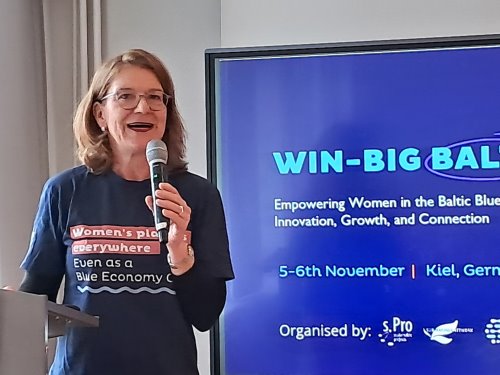
Angela Schultz-Zehden, Submariner Network
Upon the invitation of the Submariner Network, Cornelia E Nauen of Mundus maris attended the Win Big Baltic Event on 5 November in Kiel, Germany, as a panelist. The meeting took place in the Seeburg building of the university overseeing Kiel Fjord with its busy cruise ship traffic and shipyards on the opposite side.
The event was part of a series of three regional Sea Basin events (Mediterranean, Baltic and Atlantic) organised by the WIN-BIG project to strengthen gender inclusivity in the Blue Economy across Europe.
Following on from key organiser Mariana Mata Lara welcomed the participants and presented the project. She expressed her expectation that the participants would gain new insights, contacts, and strengthened capacities for their enhanced place in the Blue Economy. Angela Schultz-Zehden, also of the Submariner Network, then introduced the first panel.
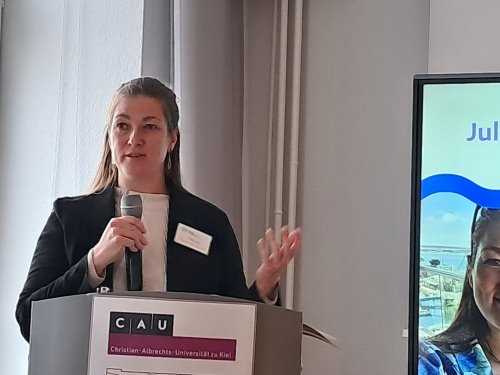
Julia Lange, Christian-Albrechts-Universität Kiel (CAU)
The morning was taken up by three panels titled:
- PANEL 1 – Women entering the Blue Economy
- PANEL 2 – Blue bioproducts, the female perspective
- PANEL 3 – Citizen engagement
Zoe Dippel of the German Federal Environment Ministry, speaking in Panel 1, underlined that Germany had signed up to the Women Ocean Guardians Initiative, a public-private initiative that elevates women frontliners. It promotes de-siloing conservation and sustainable use, to have women participate in meaningful decision-making, transforming ocean governance for more resilient and sustainable outcomes.
Among the speakers on panel 2 was Julia Lange of the Kiel University Blue Economy Cluster. This brought together 50 companies and 20 universities around maritime topics and sustainability challenges.
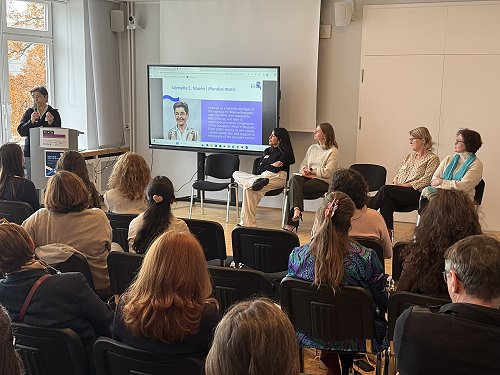
Cornelia Nauen, Mundus maris (photo WIN-BIG project)
Cornelia, speaking on panel 3 started with pointing out existing contradictions that needed to be addressed to advance the sustainability agenda. Despite the legal prohibition of overfishing in the EU’s Common Fisheries Policy, ministers in charge of fisheries had just days before adopted catch quota for Baltic herring and sprat for the industrial fish meal fleet despite the catastrophic stock situation of cod and its most important food species. These species were also fed on by seabirds and marine mammals, all in threatened or near threatened status with shrinking populations. In the political deal all the science and sustainability discourses had been irresponsibly pushed to one side.
Pitching one group against another was unhelpful – it was completely counterproductive to argue for reducing cormorants because they eat ‘our fish’. Humans, one species out of millions, were already taking almost one third of all life in the ocean for themselves and thus massively reducing biomasses first of bigger animals, but now also of their food on lower levels of the food web. That deeply affected the structure and functioning of marine ecosystems reducing their productivity.
This had curtailed European fisheries catches from a potential of more than 10 million tons produced under maximum sustainable yield (MSY) scenarios estimated in 2016 when just over 5 millions tons were recorded. Overcapacity and political expediency allocating excessive quota to industrial vessels led to a steady downward trend.
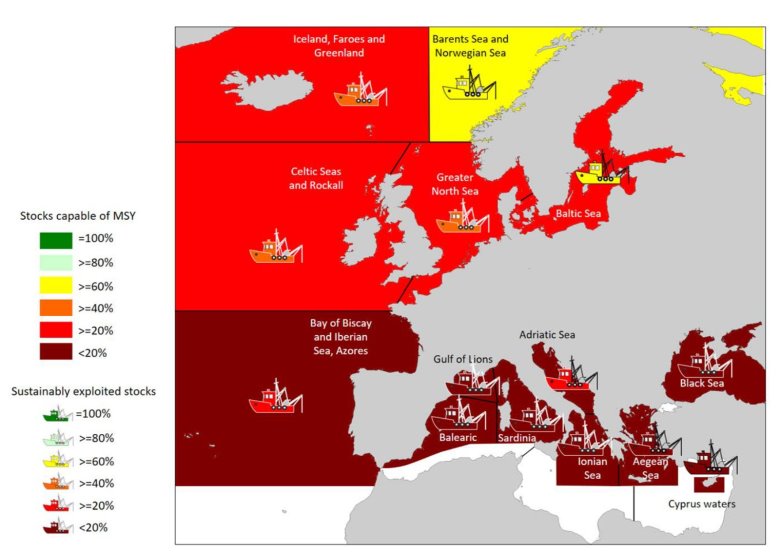
Summary of stock status from a report presented by OCEANA in 1916 based on research by an international team led by Rainer Froese of GEOMAR
Europe missed its sustainability objective for 2020 by a wide margin. Sadly, EuroStat estimated 2023 catches of only 3.3 million tons in European waters, though Euro values kept going up as relative scarcity increased prices. However, continued high demand led to further increasing imports from other parts of the world, where industrial distant water fleets, including European vessels, often compete directly with small-scale fishers. SSF are therefore increasingly fearing for their livelihoods. In Europe, meanwhile, those who used to feed the population have become largely marginalised. This structural disadvantage hits even though they produce high quality marine food with much lower environmental impact than unselective industrial mass fishing with high CO2 footprint.
Seeing the many nods in the public, Cornelia continued on the importance of broadening public engagement for ocean regeneration and just transitions so that the benefits of responsible governance and economic activities would accrue equitably and fairly.
It is crucial that women make their voices heard more loudly and help translate internationally agreed principles into thousands of locally adapted solutions. Cornelia mentioned also a few support activities and tools Mundus maris had spearheaded, such as the FishBase Guide app to help regeneration by stopping catches of juvenile fish and the role play ‘Protecting Blue Horizons’ to make a marine protected area work in practice thanks to building consensus among different stakeholders for recovery through respectful deliberations. Those interested in more information or access to support materials are welcome to contact Mundus maris at info[at]mundusmaris.org.
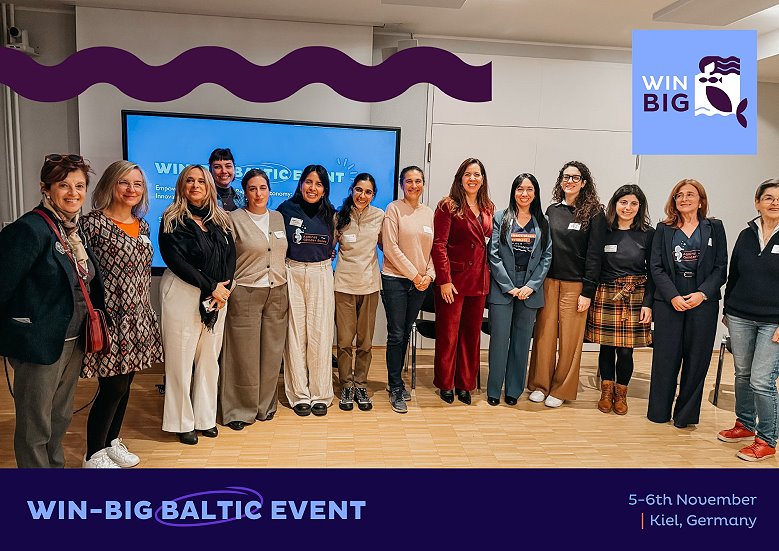
The event continued with more experience reports and useful interactive presentations, among others, on how to prepare and sustain a negotiation towards fair outcomes. An excellent example to nurture networking and joint learning so that active women participation in the Blue Economy can help achieve the better and more robust results mixed teams have already delivered in other sectors.
Il mare ci nutre
- Win Big – Baltic Event
- World Food Day 2024, Joint Webinar with Fish Party
- Relatore Speciale delle Nazioni Unite sul diritto al cibo
- EP Hearing on EU Citizen Initiative to stop shark finning
- Keynote at the ‘Feed the Future – Innovation Lab for Fish’
- FAO webinar ‘Pesce piccolo a basso prezzo: dall’esca al piatto’, 15-16/02/2021
- Pesce e frutti di mare deliziosi e sostenibili ai workshop di Mundus maris
- Chiloé, ossia: il disastro di Salmonopoli
- Seafood Symposium – Dalla pesca ai buongustai, 27 Aprile 2015
- Baltic students concerned about sustainable foods, Rogow, Poland, 15-19 April 2015
- Dai piatti al carburante – il controverso boom delle alghe in Cile
- Khazan – Traditional coastal zone management in Goa, India
- Comportamento del consumatori attento all’ambiente nel settore alimentare: cosa posso fare?
- Save baby fish or Point ‘n’ kill?
- “Inseparable” – La campagna sulla sostenibilità del pesce celebra un evento ad Atene
- Respect for minimum fish size. What do Senegalese fish mongers have to say?
- La campagna di Mundus maris nei mercati di Dakar
- Salviamo gli Oceani! – Cercle Europa esorta
- International Study Group Brussels: Save the Seas!
- Mercado San Miguel in Central Madrid
